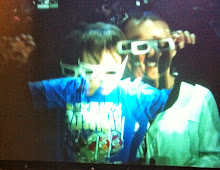School's IN for summer! Tomorrow my son and I will start spending up to a couple hours a day doing Montessori activities at home. Not everything for our homeschool is quite ready: the shelves aren't finished, I don't have a child-sized table yet, I need to make the busy boards, and the tongs and graduated blocks have yet to arrive from Amazon. But I feel like starting homeschool is sort of like having baby; no matter how much you prepare, you're never really ready. At a certain point, it's just time. I've read the books and I've acquired (most of) the materials (preparing them will be an ongoing process), so now it's time to begin. The pertinent question is where? I have a laundry list of school activities to present to Parker, but with which lesson shall I start?
Fortunately (and not surprisingly), the Montessori method was designed to be taught in a specific order. You don't just do sandpaper letters one day, pouring rice the next and the spindle box after that. There's a progression, and it makes sense to me. Practical life exercises come first; things like pouring, dusting, folding (a napkin or item of clothing), buttoning and tying a bow. These are considered school activities because once a child has mastered these tasks, he can care for himself as well as his surroundings (to a certain degree, of course). In other words, he can dress himself, wash himself, clean up after himself and keep his belongings neat and orderly. Endowing a child with a sense of independence is of primary importance to the Montessori educational philosophy. The idea is that a child needs to feel as though he has mastered his environment before he will be ready to focus on the more complicated and abstract processes and concepts (e.g., ABC's and 123's). And as a mom who spends a huge chunk of the day dressing and cleaning (and cleaning up after) her son, I can definitely get behind this whole make-your-preschooler-more-self-reliant idea. Parker does a pretty good job putting his toys away, but he has yet to show any significant interest in dressing or cleaning himself. (To be honest, this is probably at least in part because I haven't been patient enough to really allow him to spend time trying. I've tended to have the "Oh, just let me do it" attitude.)
Sensorial exercises (more about these later) follow practical life exercises, and only after that do language and numeracy activities begin. This feels a bit "back to basics" to me, and perhaps will for my son, too. Thanks to sticker books, puzzles, iPhone games, TV shows and his enthusiastic parents, Parker--on a good day--can identify all 26 letters as well as the 10 numerals. But do they mean anything to him? While watching TV, I sometimes come across that commercial in which babies "read" flash cards; the babies almost seem like performing monkeys to me. Not to denigrate my child, but I can't help but wonder whether Parker has any deeper understanding when he identifies a letter "A" or a number "3" than those "reading babies" do. I took calculus at the local junior college while I was in high school. Imagine my shock when, two years later as a college freshman, I received the following for my first mathematics assignment: read the first page of Euclid's Elements. (For those unfamiliar, the first page of Elements contains the first ten or so of Euclid's "Definitions," e.g., "The edges of a surface are lines.") It seemed insane to go back to "A point is that which has no part" and "A line is breadthless length" when I'd already passed calculus. I soon learned, however, that though I had memorized all the relevant equations, I at that point possessed no real understanding of the concepts behind calculus, or basic geometry for that matter. Only after I had gone back, begun with the Elements and then progressed forward from there, did I feel like I really knew how, for example, the Pythagorean theorem worked. So maybe activities such as sweeping and pouring are not too--shall we say--elemental for a kid who has already memorized the alphabet after all.
